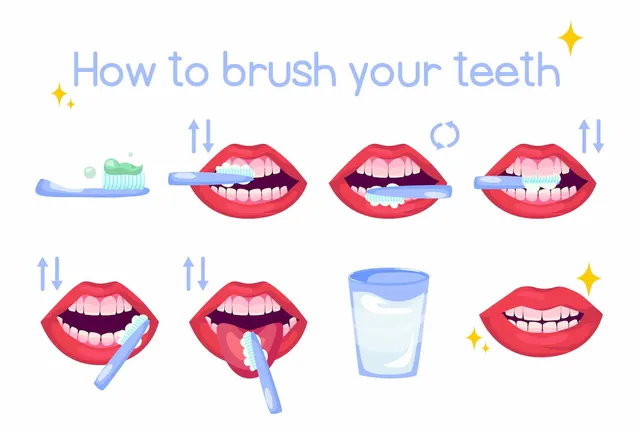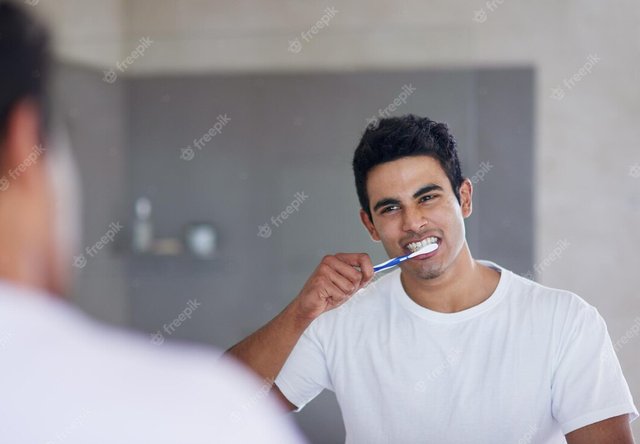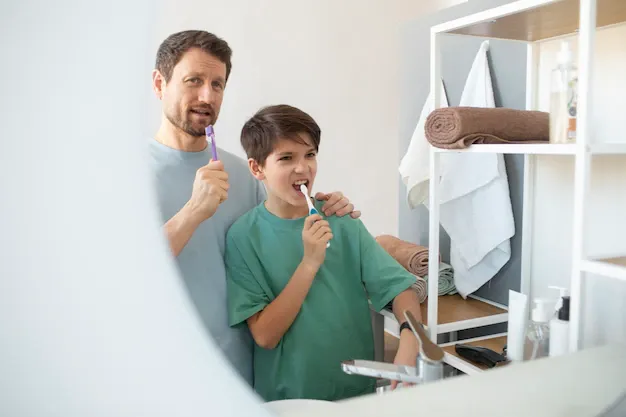What role does the teeth brushing play in the maintenance of our the health of our teeth? |
|---|
Regular teeth brushing is an essential part of maintaining good oral health. This simple yet effective practice plays a crucial role in preventing various dental issues and ensuring the longevity of our teeth.
Removal of Plaque and Tartar: Brushing our teeth helps remove plaque, a sticky film of bacteria that forms on the teeth. Plaque buildup leads to tooth decay and gum disease. Additionally, if plaque is not removed promptly, it can harden into tartar, which requires professional intervention to remove.
Prevention of Cavities: Proper brushing with fluoride toothpaste helps strengthen the tooth enamel, making it more resistant to decay-causing acids. It removes food particles and bacteria that contribute to cavity formation.
Gum Health Maintenance: Regular brushing stimulates the gums, promoting blood circulation and preventing gum diseases such as gingivitis. Proper brushing techniques also remove bacteria along the gumline, reducing the risk of periodontal problems.
Fresher Breath: Brushing eliminates food particles and bacteria that can cause bad breath. It helps maintain a fresher and more pleasant oral odor.

What do you prefer? Multiple times brushing or single time per day? |
|---|
When it comes to oral hygiene, the question of how many times one should brush their teeth arises. Is it better to brush multiple times a day or stick to a single session? The answer lies in finding the right balance.

Source
While brushing once a day might seem sufficient, oral health professionals generally recommend brushing at least twice daily. Regular brushing helps remove plaque, prevent cavities, and maintain fresh breath. By the way, my routine is to brush once a day, because I often use a daytime brush that doesn't require me to brush.

Share some tips and techniques for effective Teeth Brushing. |
|---|
Brush all tooth surfaces, including the outer, inner, and chewing surfaces. Don't forget to brush your tongue too, as it harbors bacteria.

Source
Duration: Brush for a minimum of two minutes, twice a day. Divide your mouth into quadrants and spend about 30 seconds on each section. Use a timer or play a song to ensure you brush for the recommended time.
Toothbrush Selection: Opt for a soft-bristled toothbrush that can reach all areas of your mouth comfortably. Replace your toothbrush every three to four months or sooner if the bristles become frayed.
Toothpaste: Use a fluoride-based toothpaste to strengthen enamel and prevent cavities. Use a pea-sized amount and avoid swallowing it.
Flossing and Mouthwash: Brushing alone may not reach all areas, so complement your routine with daily flossing to remove plaque between teeth. Consider using a mouthwash to rinse and freshen your breath.
Regular Check-ups: Schedule dental appointments every six months for professional cleanings and comprehensive oral examinations.
By following these tips and techniques, you can ensure that your teeth brushing routine is effective in maintaining oral health and a radiant smile.

Do brushing really improve our smile? |
|---|
Maintaining a healthy and radiant smile is a goal shared by many individuals. One common practice that comes to mind is brushing teeth. However, the question arises: does brushing really improve our smile?

Source
Brushing teeth serves as a fundamental aspect of oral hygiene. Regular brushing helps to remove plaque, bacteria, and food particles, preventing the formation of cavities and gum diseases. However, the benefits of brushing extend beyond mere cleanliness. Brushing stimulates the gums, promoting blood circulation and maintaining their overall health. Moreover, it aids in freshening breath, removing surface stains, and enhancing the appearance of teeth.
Yet, it is important to acknowledge that brushing alone cannot guarantee a perfect smile. It should be complemented by a comprehensive oral care routine, including flossing, regular dental check-ups, and a balanced diet. Additionally, brushing technique and frequency play crucial roles in obtaining optimal results.
Conclusion |
|---|
While brushing is undeniably an essential component of oral care, its impact on improving our smile goes beyond the surface level. Regular and effective brushing, combined with a holistic approach to dental health, contributes to a brighter, healthier smile. By embracing a comprehensive oral care routine, we can maximize the benefits of brushing and ensure our smiles radiate confidence and well-being.


Downvoting a post can decrease pending rewards and make it less visible. Common reasons:
Submit